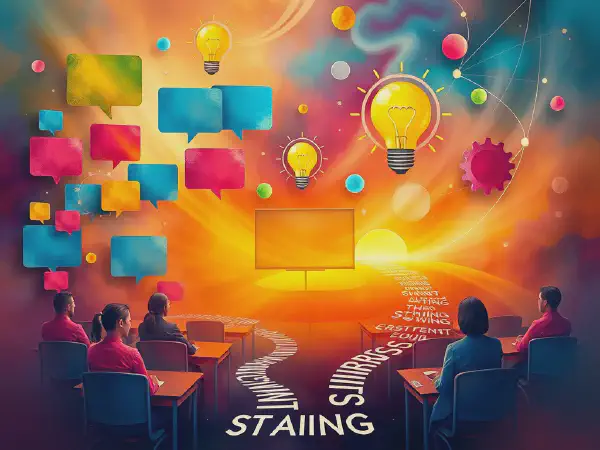Mastering Communication Skills Training for Success

Mastering Communication Skills: The Essential Training for Success
Communication skills training is an invaluable experience that provides individuals with the tools and techniques necessary to express their thoughts clearly and effectively. In today's fast-paced world, where collaboration and teamwork are pivotal, mastering communication skills is paramount to personal and professional success. This training encompasses various aspects, including verbal and non-verbal communication, active listening, and interpersonal skills, which are all essential for fostering positive relationships and achieving career advancement.
Whether in the workplace, during social interactions, or in personal relationships, effective communication is a fundamental skill that can determine the outcome of any interaction. Communication skills training equips individuals with the ability to convey messages effectively, interpret the reactions of others, and respond appropriately. This training not only enhances self-confidence but also improves one's ability to engage with others, thereby making interactions more meaningful and productive.
Moreover, communication skills training fosters an understanding of cultural differences and promotes empathy, which is crucial in today's multicultural environments. Many individuals face challenges when communicating across diverse groups; therefore, training programs often incorporate techniques that enhance cross-cultural communication. By recognizing the importance of adjusting communication styles, individuals can significantly improve their relationships and collaborations.
In summary, communication skills training is a vital investment for anyone looking to enhance their interactions and ultimately improve their personal and professional life. By developing these skills, individuals can navigate complex conversations, resolve conflicts more effectively, and foster a more positive atmosphere in both their professional and personal environments.
In conclusion, the benefits of communication skills training extend far beyond the basic ability to communicate. The insights and techniques gained through these training programs can lead to greater career opportunities, improved relationships, and a more fulfilling life. Embracing communication skills training is not just about learning how to talk; it's about learning how to connect.
Effective teams often find that investing in Communication skills training significantly enhances collaboration and productivity.
The Importance of Communication Skills
Communication skills are crucial for career advancement, as they enable individuals to effectively express their ideas, collaborate with team members, and build essential networks. Professionals with strong communication skills often enjoy more opportunities for promotions and leadership roles, as effective communication is a key attribute admired in leaders.
Moreover, communication skills play a significant role in personal relationships. The ability to express thoughts and feelings clearly fosters intimacy and understanding, allowing individuals to build strong connections with family and friends. Great communicators can navigate difficult conversations and conflicts with ease, strengthening their relationships instead of undermining them.
Furthermore, effective communication skills influence team collaboration. When team members communicate openly and effectively, they can share ideas freely, provide constructive feedback, and contribute to a positive work environment. This collaboration leads to improved productivity and innovation, making communication skills an essential asset in team settings.
Different Types of Communication Skills Training
Communication skills training can take many forms, including workshops and seminars. These sessions often provide interactive and engaging learning experiences, allowing participants to practice their skills in real time while receiving constructive feedback from trainers and peers.
Online courses have also become increasingly popular in recent years. With the flexibility they offer, these courses allow individuals to learn at their own pace and access a wide range of resources. Many online platforms provide video lectures, quizzes, and forums for discussion, making it easier to grasp essential communication concepts and techniques.
Role-playing scenarios are another effective method used in communication skills training. By simulating real-life situations, participants can practice applying their skills in various contexts, such as workplace interactions or social gatherings. This hands-on approach helps to build confidence and competence in communicating effectively.
Techniques for Effective Communication
Active listening strategies are fundamental techniques taught in communication skills training. Active listening involves being fully present in conversations, giving feedback, and demonstrating empathy. Training in this area helps participants to better understand others and reduces miscommunication.
Non-verbal communication tips are another essential component of effective communication. Body language, facial expressions, and eye contact all convey significant messages during interactions. Understanding and utilizing non-verbal cues can enhance communication and ensure clarity in the messages being delivered.
Assertiveness training is crucial for individuals who struggle to express their needs and opinions confidently. This training focuses on helping participants understand the difference between passive, aggressive, and assertive communication styles, promoting self-advocacy and respect for oneself and others in conversations.
Measuring the Success of Training Programs
Feedback and evaluation methods are critical for measuring the success of communication skills training programs. Surveys, questionnaires, and interactive assessments can provide insights into what participants have learned and how they apply those skills in real-world situations.
Long-term benefits assessment is also important to determine the lasting impact of communication skills training. Organizations often conduct follow-up evaluations to see how participants have utilized their skills over time and how it has affected their relationships and career progress.
Return on investment analysis involves examining the tangible benefits gained from communication skills training, such as improved productivity, enhanced team collaboration, and reduced interpersonal conflicts. Organizations can utilize this data to justify investment in continuous training programs.
Challenges in Communication Skills Training
Overcoming anxiety during practice is a common challenge in communication skills training. Many participants may feel nervous in role-playing scenarios or real-life situations, which can hinder their learning. Trainers need to create a supportive environment that encourages practice and constructive feedback to help individuals gain confidence.
Customization for diverse audiences is another challenge faced in communication skills training. Different audiences have unique needs and preferences, making it essential for training programs to be adaptable to various demographics and skill levels. Tailoring content and methods ensures that the training is relevant and effective for all participants.
Finally, maintaining engagement in training sessions can be a significant hurdle. Trainers must employ a variety of interactive activities, discussions, and real-life examples to keep participants interested and involved. Keeping a dynamic and engaging training atmosphere is essential for maximizing learning outcomes.
